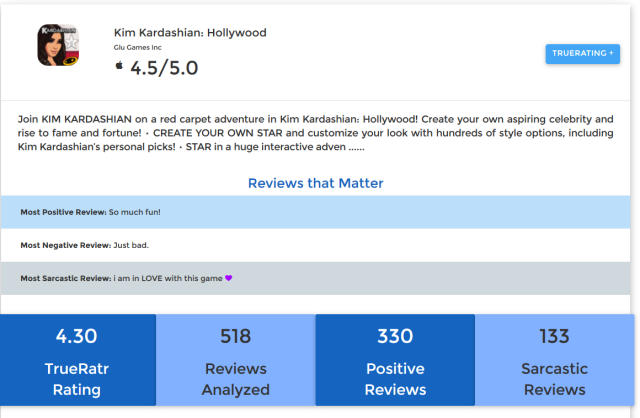|
|
Data Science News
|
Baidu Looks to Next Generation Deep Learning Accelerators
|
The Next Platform
from January 21, 2016
If the last year of stories here from research labs at the forefront of deep learning hasn’t made it clear, the accelerator of choice for training the models that will feed the next generation of speech and image recognition (not to mention a wealth of other application areas) is certainly GPUs.
However, if there is something else that should be clear from reading, the next best thing is always around the corner.
|
| |
Snark attack: Cornell students teach software to detect sarcasm!
|
Ars Technica
from January 20, 2016
A team of students participating in Cornell University’s Tech Challenge program has developed a machine learning application that attempts to break the final frontier in language processing—identifying sarcasm. This could change everything… maybe.

TrueRatr, a collaboration between Cornell Tech and Bloomberg, is intended to screen out sarcasm in product reviews. But the technology has been open sourced (and posted to GitHub) so that others can modify it to deal with other types of text-based eye-rolling.
|
| |
The machine learning problem of the next decade
|
Computerworld, Lukas Biewald
from January 21, 2016
Every engineering project has delays and issues, but machine-learning projects are harder to manage than any other. In the first week you might go from zero to 80% accuracy. The next 20% might take you another week, a month or a lifetime — it’s impossible to tell.
How do you make an 80% accurate model useful? Until we’re replaced by robots, this is going to be the machine learning challenge of the next decade.
|
| |
Meet the Robot Writing ‘Friends’ Sequels
|
The Daily Beast, Ben Collins
from January 20, 2016
Sure, a lot of the dialogue Andy Herd’s recurrent neural network comes up with is nonsense. But some of it is magic.
|
| |
Tools & Resources
|
Teach Yourself Deep Learning with TensorFlow and Udacity
|
Google Research Blog, Vincent Vanhoucke
from January 21, 2016
Deep learning has become one of the hottest topics in machine learning in recent years. With TensorFlow, the deep learning platform that we recently released as an open-source project, our goal was to bring the capabilities of deep learning to everyone. So far, we are extremely excited by the uptake: more than 4000 users have forked it on GitHub in just a few weeks, and the project has been starred more than 16000 times by enthusiasts around the globe.
To help make deep learning even more accessible to engineers and data scientists at large, we are launching a new Deep Learning Course developed in collaboration with Udacity.
|
| |